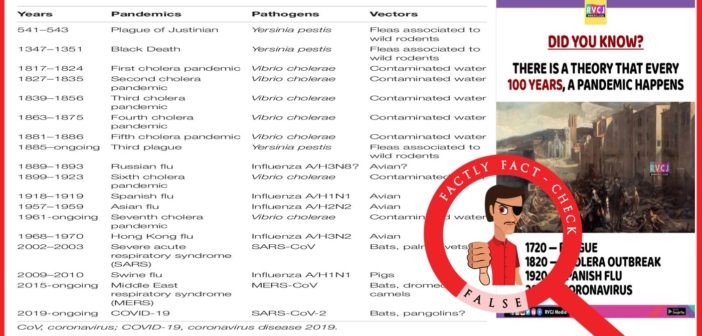An infographic that has been circulating on social media claims that the COVID-19 pandemic is part of a recurring pattern of viral outbreaks that occur once every 100 years. The graphic indicates that pandemics have occurred roughly every hundred years since 1720, with previous outbreaks including the Cholera Outbreak in 1820 and Spanish Flu in 1920. Let’s verify the claim made in the post.

Claim: Pandemics follow a regular pattern by repeating every 100 years.
Fact: The Marseille Plague, which is considered an epidemic, was an outbreak in the French region of Provence that occurred between 1720 and 1722. The first Cholera Pandemic was reported between 1817 and 1824, while the Flu Pandemic began in 1918 and ended in 1919. However, it is important to note that pandemics do not occur in regular intervals of 100 years. In fact, there have been several major pandemics throughout history, including the Asian Flu (1957-1958), Hong Kong Flu (1968-1969), and Swine Flu (2009-2010), which the post conveniently ignores. Therefore, it is inaccurate to suggest that pandemics occur in a predictable pattern. Hence the claim made in the post is FALSE.
A pandemic is an outbreak of infectious disease that occurs over a wide geographical area and that is of high prevalence. A pandemic generally affects a significant proportion of the world’s population, usually over the course of several months. To begin with, we verified the accuracy of the pandemic dates mentioned in the viral post.
Marseille Plague (1720- 1722)
The Great Plague of 1720, also known as the Marseille Plague, was an outbreak of Bubonic plague that primarily affected the city of Marseille, France, from 1720 to 1722. While it caused significant mortality and social disruption within the city, it did not spread widely beyond the region. Therefore, it is classified as an epidemic rather than a pandemic. The book titled ‘The Great Plague Scare of 1720’ describes it as an epidemic that hit the French region of Provence and surrounding areas during the same period.
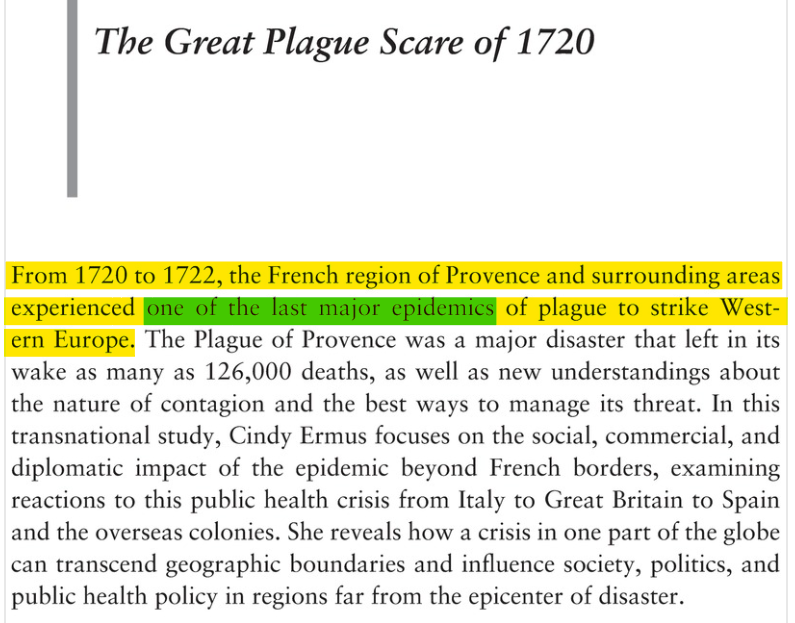
First Cholera Pandemic (1817- 1824)
The post’s claim that the cholera pandemic began in 1820 is not accurate, as historical records indicate that the first recorded pandemic of cholera began three years earlier than the claimed date. The cholera outbreak that began in 1817 in the Ganges Delta region of India lasted until 1824 and spread to Southeast Asia, the Middle East, and parts of Africa and Europe during this period. The exact number of deaths caused by the outbreak is unknown but estimates range from 1 to 6 million people.
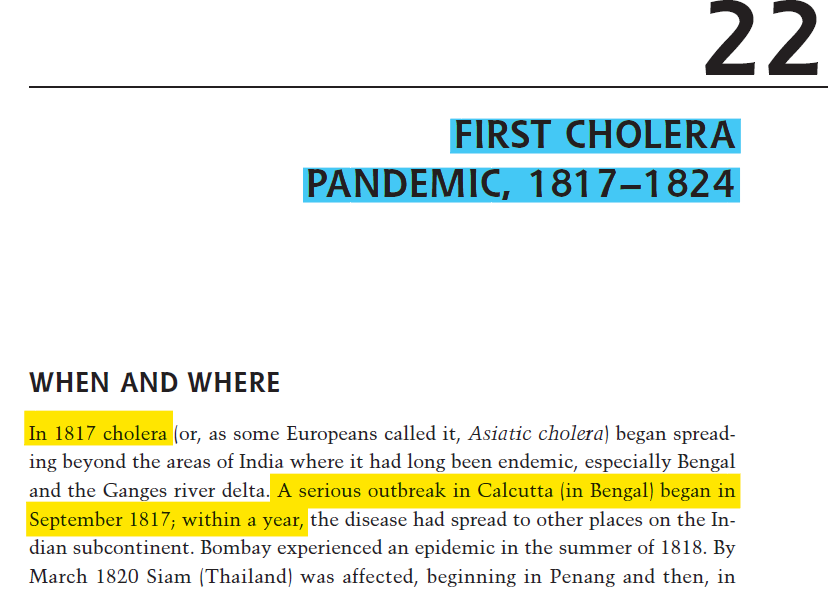
The Great Influenza Pandemic (1918- 1919)
According to Centres for Disease Control and Prevention, The Influenza Pandemic, also known as the Spanish Flu (a misnomer as the origin of the virus is still unknown), was first identified in military personnel in the United States in 1918. Although there is no universal consensus regarding where the virus originated, it spread worldwide during 1918-1919. Hence, the Flu pandemic started two years earlier than the date claimed in the post.
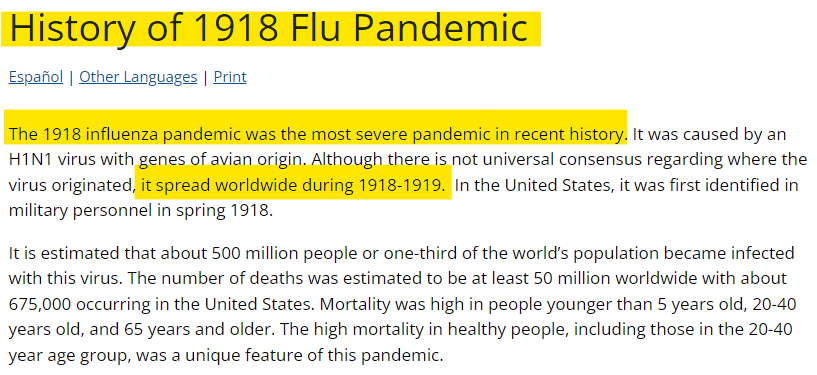
COVID-19 Pandemic (2019)
While the first cases were reported at the end of 2019, the World Health Organization did not officially declare it a pandemic until March 2020. Furthermore, the viral post selectively ignores the numerous pandemics throughout history, such as the Asian Flu (1957-1958), Hong Kong Flu (1968-1969), and Swine Flu (2009-2010), among others. This cherry-picked approach creates the false impression that pandemics occur with regularity every 100 years, which is not supported by the available evidence. A list featuring the major Epidemics and Pandemics can be seen here.
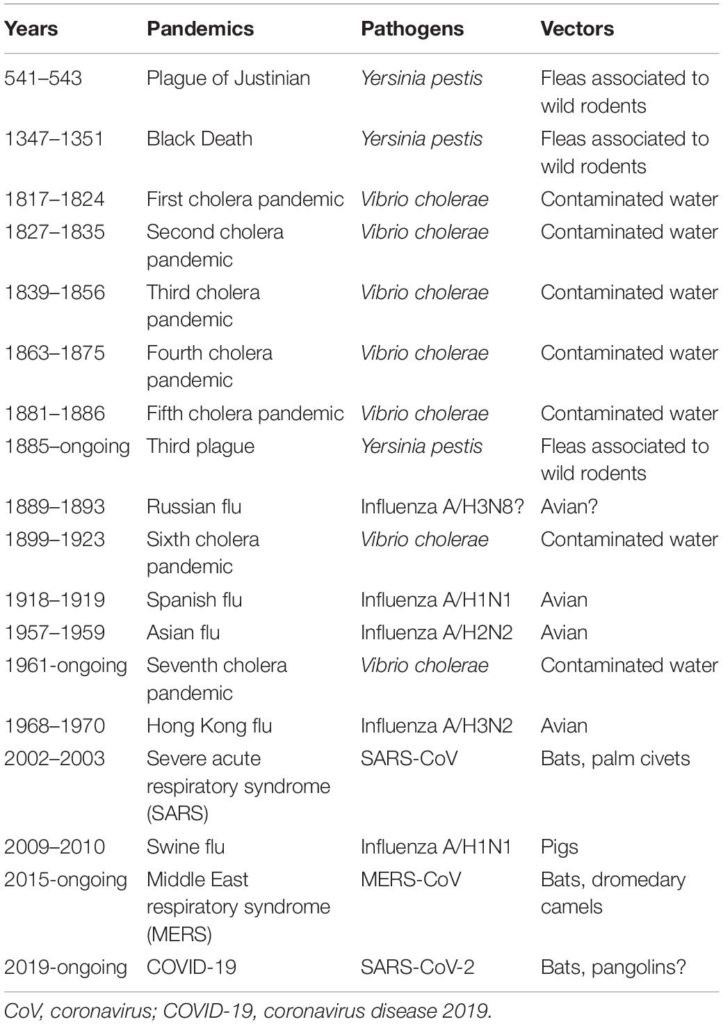
To sum it up, there is no empirical evidence to support the claim that pandemics occur in cycles of 100 years.


